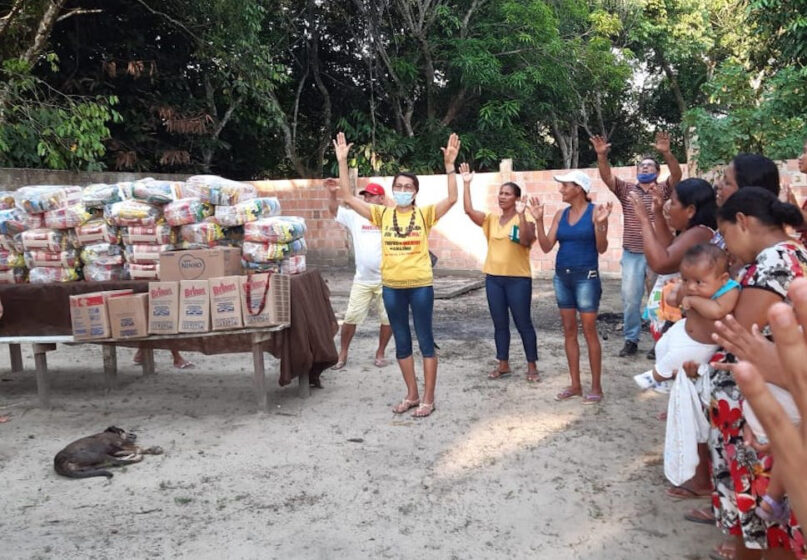SAO PAULO (Global Sisters Report) — Religious presence in the Amazon region in the past year has been a challenge. But between distributing food and lending a friendly ear to those afflicted by unemployment, hunger and despair, the religious women working in Brazil’s Amazonas state have been a driving force, helping the population cope with the dramatic situation of COVID-19 in the region.
They have also, however, faced their own anguishes because of social distancing.
“I believe our greatest struggle is to know that these people, who live far from cities and [are] isolated, are in desperate need, and we are not being able to help them personally,” said Sr. Roselei Bertoldo, missionary of the Congregation of the Immaculate Heart of Mary, who lives in the capital city of Manaus in the middle of the Amazon jungle.
RELATED: Missionaries gain access to Amazon’s Indigenous peoples, despite pandemic
“COVID-19 makes you very lonely, especially at night,” said Sr. Maria Aparecida Marques Fernandes, a Franciscan Catechist who has been living in São Gabriel da Cachoeira, known as the most Indigenous city in Brazil, for the past eight years. The city borders Colombia and Venezuela and is home to 23 ethnicities and 18 different Indigenous languages in addition to Portuguese.
Fernandes, who has had COVID-19 twice, told Global Sisters Report that the most difficult aspect of the pandemic is the imposed social isolation and the lack of physical contact with people from the community.
“Listening is now done over the phone and over the internet,” she said. “We [missionaries] were forced to learn another type of listening, something other than face-to-face communication. Isolation forced us to reformulate, to readapt; we had to pray differently and create new ways of being present.”
Since March 2020, almost 320,000 people in Amazonas state, which has a population of 1.4 million, contracted COVID-19, and over 11,000 died from complications related to the coronavirus, according to official figures from the Amazonas Health Surveillance Foundation. Brazil has been one of the countries hardest-hit by the virus, especially with the recent outbreak of a more contagious variant.
Lockdowns are determined locally by mayors and governors. Currently, eight of the 27 Brazilian states have some level of lockdown, ranging from stay-home orders to curfews to only essential services operating during weekends. This is the second time Brazilian officials have imposed restrictions to halt the spread of COVID-19; the first time was in March 2020 and lasted, in some cases, until June.
To lessen the isolation felt by many forced to remain at home during the second wave of COVID-19, which began in December, the Archdiocese of Manaus at the beginning of February started a hotline for people who feel lonely. The group began with 30 volunteers, 15 of whom are religious sisters, including Bertoldo.
“They call to unburden themselves, to talk about their pain,” said Bertoldo, noting that “being able to speak, being able to externalize what they are feeling is very important.”
“During the first two days of operation, I had already received three calls,” Bertoldo said.
And it is not only the population that feels the strains of isolation. Fernandes herself said what she missed the most during these past few months have been the visits to the remote communities along the river.
“Between the first and the second waves [April to June and December to February], we returned to making our regular visits, and those were very fulfilling,” she said. “I made eight visits between July and November, and although it sometimes took 10 days by boat to reach some of these communities, these visits have been some of the best experiences I’ve had in my life.”
In addition to difficulties caused by social distancing, sisters in the region are also tackling pandemic-related hunger and unemployment in big cities like Manaus.
Bertoldo’s congregation, for example, started to distribute food baskets and hygiene products to families living along the riverbed on the outskirts of Manaus, something the congregation did not do before the pandemic.
“The number of people going hungry in and around Manaus has surged, and many are desperate,” she said.
The constant lockdowns and stay-at-home orders have also made vulnerable a surging mass of unemployed, who fall prey to people who pretend to offer employment but only want to exploit them. Bertoldo, who is also an active member of the Um Grito pela Vida (A Cry for Life) network, which combats human trafficking, said youths are particularly at risk.
“The exploitation of young people via the internet has grown significantly. There has been a surge of job offers over the web, and when these youngsters answer these ads, they are sent to houses of prostitution and places where they are forced to perform virtual sex,” she said.
The network’s work, which used to be done in schools and through conferences, is now conducted virtually through webinars about domestic violence, sexual exploitation and human trafficking.
“The number of official complaints has dropped a lot, even though we know that violence has not,” she said.
This story originally appeared in the Global Sisters Report, a project of National Catholic Reporter.





